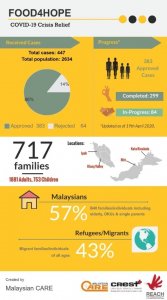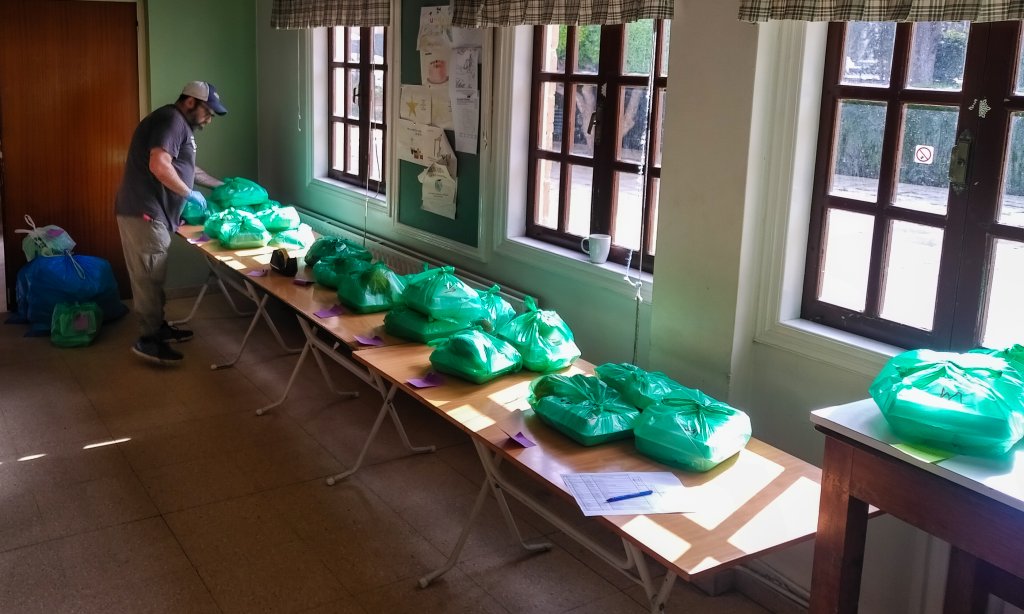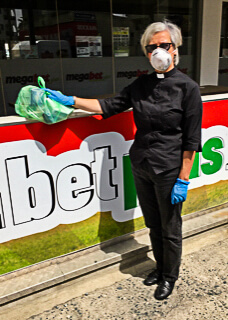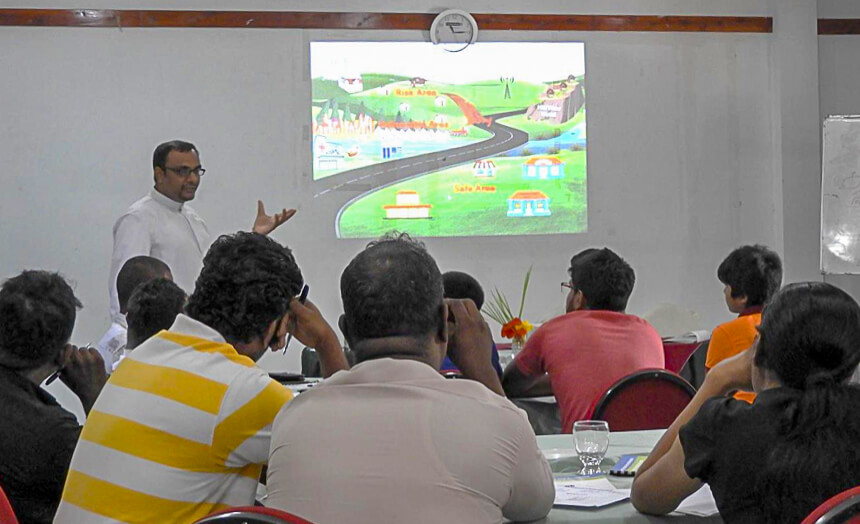We are building this page of stories from across the Anglican Communion so please keep coming back as we add more.
On this page:
Responding to food insecurity in Jordan – by Joel Kelling, Anglican Alliance Facilitator for the Middle East
Drawing on years of asset-based experience in the Philippines – The Episcopal Church of the Philippines
Reaching out to marginalised, vulnerable and impoverished people in Punjab, India – Diocese of Amritsar
Supporting homeless people in San Francisco – Episcopal Community Services
Working in partnership to provide Food4Hope – Diocese of West Malaysia
Providing food to vulnerable and marginalised people in Cyprus – by Joel Kelling, Anglican Alliance Facilitator for the Middle East
Sri Lanka – providing food security and seeing the value of established disaster response teams – Church of Ceylon
Solidarity with indigenous people in Brazil: approaching, walking together, being present and sharing love – Anglican Diocese of Amazon, Brazil, IEAB
Responding to food insecurity in Jordan
Joel Kelling, Anglican Alliance Facilitator for the Middle East
In Jordan, the shutdown in response to the ongoing COVID-19 pandemic began on 21st March. Full or partial curfew has been in place since. The speed and efficacy of the government’s response has been praised in Europe and North America, and has seemed to slow the spread of the virus. However, the speed with which the initial, full curfew was imposed caught many by surprise and without time to prepare in regard to money or food.
In Ashrafiyeh, in east Amman, many people weren’t in a position to prepare anyway, even without a time constraint. Many of the residents are day labourers, and the lockdown has deprived them of any opportunity to work and, therefore, the ability to earn money to buy food. In addition, many of those living in the neighbourhood are Iraqi refugees and Egyptian migrants, already more vulnerable in regard to food and job security.
In response to the challenge, St. Paul’s Anglican Church has worked to provide food parcels for those in need. The lockdown made accessing the necessary money extremely difficult: Fr. George al-Kopti was unable to access a bank (there are none in the neighbourhood, and driving has been banned) and couldn’t get a co-signatory to church cheques. However, he was able to negotiate with vendors to provide food on promise of payment once it becomes possible, and some of the providers actually donated extra food when they discovered how the church was trying to help. In the meantime, Anglican Aid in Australia have offered to provide some funding, adding to the funds that St. Paul’s have themselves pledged to the cause.
Over 4th-5th April, the church was able to provide food parcels for 60 families, and in the coming week, Fr. George hopes to provide enough for a further 25 families. Restrictions on movement have been reduced enough for people to walk within their neighbourhood in order to shop for food, and the church was opened for those two days to receive the families that Fr. George had been in touch with.
One of the surprising realities of the ongoing crisis is that it isn’t only the poorest or most vulnerable who are in need of food. Fr George related how one of his congregation’s more middle-class families who own a (non-food) shop has seen their income disappear overnight because of the lockdown, and they are equally unable to afford food. Fr. George reflected that as the crisis continues these sorts of vulnerabilities are likely to be exacerbated, and as things return to ‘normal’ families who have lost weeks or even months of wages will struggle to pay their children’s school fees, prolonging the impact of lockdown.
Fr. George feels that this ministry of aid is only one part of the work that the church is doing to support members at this extraordinary time. He is also sharing his Sunday sermons online and recording and sharing a worship service via WhatsApp (amongst a community that mostly is online via limited mobile data packages). In addition, he has begun providing daily devotions for the congregation. He related that he has been really encouraged by how many people have taken up the practice and are now reading the Bible and praying on a daily basis (where perhaps they didn’t before). One morning this week he was contacted at 08:10 by one of the congregation wanting to know why he hadn’t posted anything yet that morning! Fr. George is hopeful that in these difficult days, people’s faith may be strengthened, and the church continue to grow and learn new ways to be disciples of Jesus.
The Philippines
We are most grateful to Floyd Lalwet, Director of E-CARE, Episcopal Church of the Philippines, for providing the material for this case study.
The best practices developed and established over many years by the Episcopal Church in the Philippines (ECP) – through its E-CARE Foundation – are proving immensely valuable as the Church now responds to the COVID-19 pandemic. Two particular best practices stand out, both of which depend on the agency and assets of local people rather than looking to outside help. These are the production and supply of the most needed items in times of disaster and the promotion of alternative livelihood skills to supplement people’s incomes. This case study ends with a further – and beautiful – example of how ECP’s determination to do the right thing in a previous crisis has brought a blessing in this one.
Production and supply of the most needed items in times of disasters
After a disaster, relief goods are usually purchased from, and supplied by, big business. However, the Episcopal Church advocates for, and practises, the mobilisation of local assets to meet these needs. At the height of the relief operation after super-typhoon Yolanda, E-CARE was able to mobilize around P10 million ($200,000)-worth of rice, vegetable packs, vegetable noodles etc. from its various local partners as food relief to the devastated communities. As well as providing healthier foods to the recipients, the project benefitted the producers.
On 24th March 2020, one of the leading government hospitals dedicated to the treatment of COVID-19 patients, the Lung Center of the Philippines (LCP), stopped admitting further patients because it no longer had any personal protective equipment (PPE). The day before, it had appealed for donations as it was critically low. This very sad predicament is being experienced by many other government hospitals and treatment centers.
In response, the Church started a project for the production and donation of the much-needed PPE, engaging its human resources, assets and partners for their production. A multi-award-winning fashion designer, Mr. Santi Obcena, offered his services and has developed a prototype and pattern for washable face masks. Mr Obcena donated and personally cut the materials, which are now ready for sewing and he has also produced a video tutorial on how to sew them since it is not possible for physical orientation and training to be done. His design was featured on GMA television.
The sewing will now mainly be done by E-CARE partner sewers in the urban poor communities of Miramonte, Caloocan, who are otherwise without income at this time of total lockdown This project is therefore also providing much needed income for people who are in a very precarious situation themselves. E-CARE is fund-raising for the labour costs and the project received a major boost when the Episcopal Relief & Development offered to contribute a sizeable amount.
Promotion of alternative livelihood skills to supplement income
E-CARE also provides – and vigorously promotes – training for its partners to acquire new skills that can provide an alternative source of income, usually in addition to their main source of income such as agriculture or fishing. Such training can be seen as a time-consuming (and therefore costly) luxury and its value has been questioned as a Disaster Response and Recovery measure. However, in a country prone to natural disasters the alternative livelihood skills have proved their worth and have spared households the humiliating experience of being dependent on relief every time a disaster strikes. When farmlands are devastated, fishing stopped and employment under “no work, no pay” schemes closed by typhoons, earthquakes, etc., E-CARE partners retrieve their shelved but treasured skills and pursue various economic activities, such as handicrafting, food processing, turmeric production, etc.
The same is true now, with COVID-19. Aling Mary de la Cruz is a 38 year old single parent of two young daughters and is the current president of Seashore Songcolan Livelihood Association (SSLA). Her main source of income is making and selling shell-crafts – clocks, candleholders, decorative items and many other items made from seashells. She has trained other female members of the association, many of whom are spouses of fishermen, in shell-craft. With everyone in the country staying at home due to the COVID-19 pandemic, the fishing activities of Songcolan have been halted and fisherfolks have no income. SSLA women, however, are not un-productive. With their skills on shell-craft, they have joined Mary and are now crafting various items that they hope to sell when travel restrictions ease up.
The current crisis has also proved the merit of other measures and advocacy undertaken by the Church. Last year, the ECP Council of Bishops questioned the Rice Tarrification Law. This law resulted in imported rice flooding the market and leaving local rice farmers unable to sell their produce, even at a price that only covers the costs of production. As well as issuing the statement, however, the Church – through E-CARE – also purchased rice from its partner farming communities in Nueva Ecija, who were literally crying in desperation. Truckloads of the rice were delivered to the E-CARE store in Quezon City for selling on. Because of the crisis, E-CARE purchased higher volumes than usual, and had difficulty selling the rice as they had far more than what its regular clientele needed. But then, on March 31st, Bishop Rex R.B. Reyes, Jr. issued a call for food relief for urban poor communities. Local churches within the diocese responded positively but had nowhere big enough quantities because of the restrictions to prevent hoarding. E-CARE’s rice stock has suddenly found its market.
The way the Episcopal Church is coping with the current crisis is a story of partnership, of hope and action, and of applying the learnings that have been established as best practice.
India – Diocese of Amritsar
In Punjab, the Diocese of Amritsar has initiated a COVID-19 relief operation to support people who have been hit particularly hard by India’s lockdown. The short video below shows the wide-ranging responses of the diocese as it reaches out to vulnerable and marginalised people. Among other activities the Community Outreach Team is preparing meals every day for around 500 migrant workers, stranded travellers, slum dwellers, the police and service-delivery workers in Amritsar City; dry food stuffs are being distributed to both urban and rural families in need; and a face mask-making project has been initiated among self-help groups to help members generate a small income during the economic downturn.
USA
Episcopal Community Services (ECS) of San Francisco has a long-established ministry helping homeless people, including through the provision of night shelters. Their shelters and navigation centres, which together serve around 700 people, remain open and fully operational. ECS say, “Each site has personal protective equipment such as masks, gloves, sanitizer, and other supplies available for guests and staff. We have expanded janitorial and cleaning services to minimize the spread of the virus. To keep our guests and community safe and healthy, we have added a lunchtime meal at Next Door and Sanctuary Shelters, so guests do not need to leave to access food. We have staggered meal times to allow for more space between guests while dining. Navigation Centers continue to have prepared meals available throughout the day.”
Read more here.
West Malaysia
 The Diocese of West Malaysia’s REACH – Relief Emergency And Crisis Help – unit is working with a Christian NGO called CREST and Malaysian Care on a project called ‘FOOD4HOPE’ to receive, process and deliver on requests for food assistance. The Diocese helps through a sharing of human resource and finance.
The Diocese of West Malaysia’s REACH – Relief Emergency And Crisis Help – unit is working with a Christian NGO called CREST and Malaysian Care on a project called ‘FOOD4HOPE’ to receive, process and deliver on requests for food assistance. The Diocese helps through a sharing of human resource and finance.
Providing food to vulnerable and marginalised people in Cyprus
Joel Kelling, Anglican Alliance Middle East Facilitator
Christian communities in Cyprus have long been supporting the refugees and asylum seekers who have been arriving there, from the Middle East and Sub-Saharan Africa, in growing numbers in recent years. Their hospitality has included a meal and activities hosted by St. Paul’s Anglican Cathedral in Nicosia on the first Monday of each month. The welcome and support provided by Christian communities is a lifeline to the displaced people who suffer from racism and exploitation, particularly with regard to accessing food. They are often reliant on food vouchers, which can only be used in certain shops, where goods cost more than those bought with cash. The Prince of Wales and Duchess of Cornwall had been due to visit the cathedral to learn about the support provided by the island’s Christian communities – but their visit had to be postponed because of the COVID-19 pandemic. The royal couple might not have visited, but the work of the Church continues.
The COVID-19 outbreak has made things more difficult for many of the displaced people residing in Cyprus. The Cyprus Refugee Council has reported that the Cypriot government has moved increasing numbers of asylum seekers out of the hostels where they have been living back into the Kokkinotrimithia reception centre. The Refugee Council describes the reception centre as “a detention centre made up of tents where people are living in appalling conditions”. The Minister of the Interior has countered these claims, describing the conditions as “acceptable” and noting that there are currently no COVID-19 cases amongst registered migrants.
Government restrictions in place as a result of the Coronavirus mean that all residents in Cyprus have to send an SMS before they are able to leave their home, and can only do so once a day for food. Additional travel requires permits from the local authorities.

Preparing food packages for distribution. Photo:Revd. Justin Arnott
It is against this backdrop that St. Paul’s Cathedral, assisted by Refugee Support Europe and other individuals (both Christian and non-religious), was able to deliver 150 meals to asylum-seekers, refugees and others in need on Monday 13th April. A further 80 or so meals were provided on Wednesday 15th and around 130 more on Monday 20th April. The Revd. Justin Arnott described the meals as “not much more than what someone might get from a take-away… Yet to the people receiving it, it’s a takeout they wouldn’t have been able to order, and now, even though they can go out to buy essential goods, some, for a variety of reasons, have nothing to buy [food] with”. St. Paul’s has the capacity to provide batches of up to 100 meals twice a week, with occasional bursts providing more. It is aware of other churches and organisations that would like to work in partnership on this initiative and who might perhaps be able to provide funding for both buying and delivering supplies. Beyond food, other basic goods, such as toilet paper, are needed.

Revd. Anne Futcher dropping off a food parcel, Larnaca
Similarly, the congregation of St. Helena’s, Larnaca, has joined in the work that the Christian charity Oasis is engaged in. This week the Revd. Anne Futcher, who is the Social Concern Officer for the Archdeaconry and an associate priest at St. Helena’s, joined in the work of local Christian charity, Oasis, which overall delivered food to some 100 refugees. She is one of a small group of volunteers from St. Helena’s Church who have made themselves available to help regularly during lockdown. Anne described some of the challenges of finding addresses that had been translated from Greek into English (not always accurately), calling the families in advance and leaving the food bags 4 metres from people’s doors. Anne described being stopped by a police officer who was checking the travel permits – and how she was both encouraging and encouraged to hear of this action being taken to care for the vulnerable.
Many of the members of Anglican congregations on Cyprus are retired, and therefore typically older. However, this hasn’t prevented them from making a real difference, taking a range of actions including the small, but essential, distribution of food to 10 families by Ammochostos Parish and providing pastoral care through phone calls.
There is growing need because of the pandemic in Cyprus, as elsewhere, not just amongst asylum seekers and refugees, but also amongst Cypriot nationals who are suffering through loss of work and security, and amongst people who are hard to reach. Support will need to continue for asylum-seekers, refugees and those in need well beyond the end of the COVID-19 pandemic to counter increased levels of hardship.
Sri Lanka
With thanks to Binnu Selvarajah – Coordinator of the Board of Social Responsibility of the Diocese of Colombo for providing the material for this story
In Sri Lanka, the two dioceses of the Church of Ceylon are providing assistance to meet the needs of the most vulnerable and marginalised people in their communities.
The Bishop of Colombo, Bishop Dhiloraj Canagasabey, has written to his diocese urging people to action, saying, “It is important also that clergy and the lay in parishes organize themselves, together with the authorities to provide care for those in their areas such as the sick, the elderly who live alone, the vulnerable and the poor, providing comfort food and medicine.
“There are many who have been very badly affected by the lockdown and curfew imposed and has lost their sources of income overnight. As a caring Christian community, the Church is called to respond even in this situation to the best of our ability. Thus, the Diocese through the Board of Social Responsibility, (BSR) has already put into place a programme to educate parishes through clergy at regional level to carry out humanitarian assistance through providing dry ration packs for the needy in the Southern, Uva, Eastern, North Western and Sabaragamuwa Provinces and in the hill country.”
In the first weeks of their response, the Diocese of Colombo mobilized resources locally from churches and well-wishers to assist less fortunate families in the regions, in collaboration with local officials, the police and health authorities. As time has gone on, they have started approaching external partners to provide support, among these Epsicopal Relief & Development, who are now funding some of the ongoing work. The recipients are mostly people dependent on daily wage and people working on tea estate areas. They have supported 1,850 families in the four provinces of the diocese as of the 6th April.
The other diocese of the Church of Ceylon, the Diocese of Kurunegala has also responded, with the assistance local families, parishes, well wishers and the diocese. Through this they have been able to support the hardest hit families.

A training (which took place long before COVID-19) for an ecumenical group of lay people to build regional disaster response and resilience teams
As for the Philippines, the established asset-based church and community transformation approach of the Anglican Church of Ceylon is proving highly valuable in the current circumstances. For several years, the Anglican Church in Sri Lanka has been working to equip a network of ecumenical partners in the National Christian Council (NCC) on disaster resilience. These ecumenical regional teams have been quick to respond to COVID-19 by building on their local networks to identify marginalized people for relief items. The NCC is also providing health messaging through the phone and smartphone networks. Read more about the Disaster Resilience Programme of the Diocese of Colombo on pages 11 and 12 of our Report of the Asia Consultation on Asset-Based Church and Community Transformation Consultation, held in Myanmar July 2019
As the Church of Ceylon continues this process, they ask for our prayers.
Brazil
With thanks to the Community of Manaus, Anglican Diocese of Amazon, Brazil, IEAB for this story (April 2020)
Solidarity with indigenous people. Approaching, walking together, being present and sharing love
The COVID-19 pandemic has hit indigenous communities in Brazil hard. The Amazon region is suffering. The Brazilian State has neglected its role in protecting indigenous peoples. They are being hit hard by the lack of minimal health care, having no access to masks and protection supplies and much less guidance. The situation is even worse for the people who live on the outskirts of the city of Manaus. Many families have already experienced fatalities.
The Anglican Community of Manaus, Santa Maria Madalena Missionary Point, Apostle of the Apostles, Anglican Diocese of the Amazon, celebrated Paschal Agape differently, sharing resources to manufacture more than 450 units of homemade masks for the protection of the elderly and people at risk in the largest indigenous neighbourhood in the city of Manaus, Parque das Tribos, where more than 400 families from 35 ethnic groups live.
The Anglican Community joined forces with AMARN Numiã Kurá (Association of Indigenous Women Artisans of the Upper Rio Negro) to help more than 70 families led by indigenous women who are vulnerable in this quarantine because they are unable to work and resell their handicrafts which is their main source of livelihood.
We ask all friends to keep this ministry in your prayers as a Christian family so that the Good Lord may support us with the strength of his Resurrection to do good here in the Heart of the Amazon, inspired by the intrepid and tenacious testimony of Saint Mary Magdalene, the Apostle of the Resurrection.
